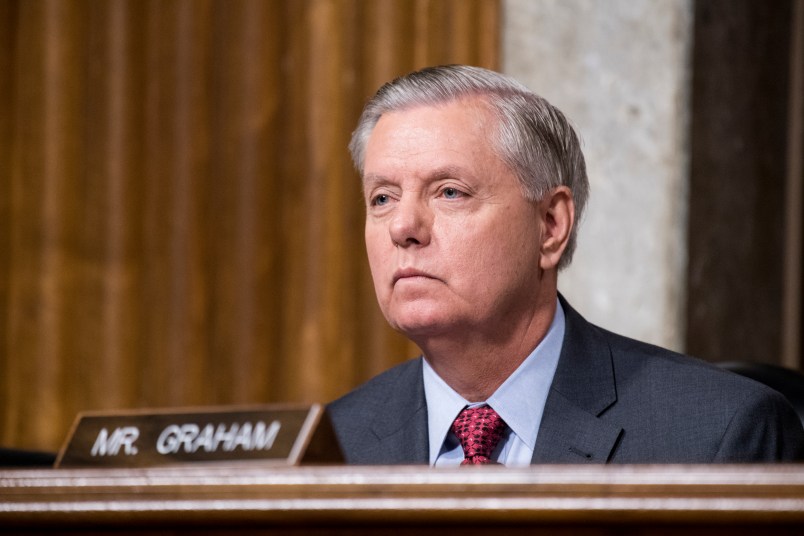Sen. Lindsey Graham (R-SC) warned Monday that a Democratic filibuster on Supreme Court nominee Neil Gorsuch would mean “the end of bipartisanship on judges.”
Despite three Senate Democrats recently announcing their support for Gorsuch, there aren’t yet the 60 votes necessary for cloture on a filibuster — meaning, according to Graham, that Senate Majority Leader Mitch McConnell (R-KY) would invoke the so-called “nuclear option” and eliminate the option of filibustering Supreme Court nominees altogether via a procedural vote.
“It certainly is the end of bipartisanship on judges,” if Democrats filibuster Gorsuch, Graham told reporters, in an exchange broadcast by MSNBC. “We’ll have a partisan vote on every federal judge, at least at the circuit and Supreme Court level. Reaching across the aisle will be a thing of the past. You’ll get more ideological judges. And it makes every open Senate seat a referendum on the future of the Supreme Court. That’s what happens when you do it within one party.”
Asked if McConnell would invoke the nuclear option if faced with a a filibuster, Graham responded, “Oh yeah, we have no other choice.”
“We’re not going to have a rule, a tradition in the Senate where they get their judges and President Trump can’t get his,” he said.
Gorsuch would be the second Supreme Court nominee to be blocked by a filibuster (then-Associate Justice Abe Fortas was blocked by a filibuster from receiving a vote on becoming the court’s chief justice in 1968).
Still, Gorsuch would have at least received a hearing in the Senate Judiciary Committee — which Judge Merrick Garland, whom former President Barack Obama nominated, was denied.
Garland was “well-qualified, but an opening in the last year of the presidency, after the primaries started, generally is not filled,” Graham said Monday.
During the last two years of the Obama administration, the Republican Senate majority also blocked a nearly unprecedented number of judicial nominees at the district and circuit court levels. In 2013, the Democratic Senate majority eliminated the filibuster for executive branch and judicial nominees, except for the Supreme Court.
“We’ve entered a new phase in the U.S. Senate now,” Graham said, referring to the prospect of McConnell employing the nuclear option. “When it comes to judges, it will be a partisan exercise. There will be no need to reach across the aisle. That will take a toll on the Senate and the judiciary.”
This post has been updated.







Merrick Garland: Yup!
Lindsey Graham Cracker
Boy, that was one impressive argument.
No, dipstick, that ended when Republican’ts refused to hold hearings for Merrick Garland. But hey! Why let the truth get in the way of a good story?
No Lindsey …
It’s shit like this that kills bipartisanship in the broader sense —